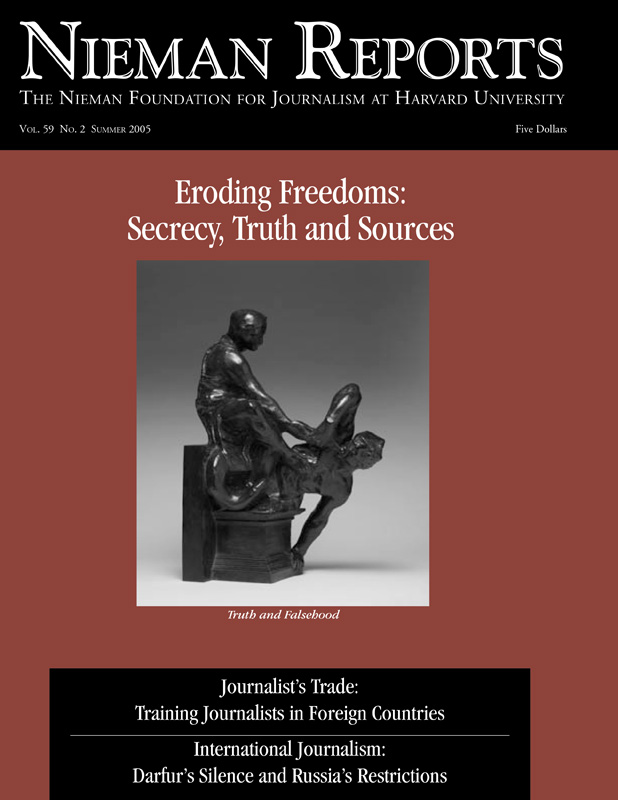
Eroding Freedoms: Secrecy, Truth and Sources
Among the casualties of the invasion and occupation of Iraq have been truth and trust, according to Sig Christenson, military affairs writer for the San Antonio Express-News. After working as both an embedded and independent reporter in Iraq, he writes about the “propaganda war within Gulf War II,” explaining that “Its roots are in Ground Zero, and I have been a willing participant. So, too, were many other reporters.”
Geneva Overholser: Does the White House have enough power that it can simply dictate to us all the terms?
RELATED ARTICLES
- “‘The Seduction of Secrecy: Toward Better Access to Government Information on the Record’”
- “The White House: Can It Control the Press?”
- “Reporting in an Era of Heightened Concern About Anonymous Sources”
- “Offering Anonymity Too Easily to Sources”Mike McCurry (White House press secretary for President Bill Clinton): Apparently now, yes. I used to think that if I ever tried to control the message as effectively as the current White House does I would have been run out of the press briefing room, but clearly I misjudged the temperament that exists. If you are disciplined, and if your view of the press is that they are caged animals brought out once a day to be fed appropriately and digest whatever it is that you have to say and send them back into the little cages that they live in at the White House, then you can do a pretty effective job of keeping control of the story line in the face of all the blizzard that is out there in the world. To be coherent, some would argue you almost have to do that in order to communicate effectively about the story line of what a presidency is about today. So yes, they have enough power if they are disciplined enough to control themselves and not to talk off the reservation. And this White House is very effective at that. Of course, that’s a contrast to the previous White House, which I would say leaked like a sieve most of the time.
Overholser: Jack Nelson, you’ve looked at this topic for a long time. How do White House off-the-record briefings these days look compared to when you first became involved in the issue?
Jack Nelson (former Washington bureau chief, Los Angeles Times): It varies with the President. President Carter, for example, ran a very open White House. You could walk down the hallway in the Carter White House without being bothered by anybody. And the first President Bush talked to reporters much more so than the current President Bush. He held—the people in his administration held—many background briefings. It did leak, sometimes officially, sometimes unofficially. President Reagan’s administration was much more open than the current one. I’ve been a reporter for over 50 years and an investigative reporter much of that time, and this administration is by far the most secretive administration I’ve had any experience with. They have no shame in doing things in the dark, and I don’t know how we really combat that except to just keep battering away and filing Freedom of Information lawsuits, talking to people on Capitol Hill and to every lower official we can get to talk to us who is interested in the people knowing what their government is doing. What we need to do is to emphasize that this isn’t just a Republican administration; this is your government, all three branches of which happen to be controlled by one party, which makes it even more of a responsibility of the press to try to delve into it.
Overholser: Paul McMasters, is it worse than ever? Not just briefings, but secrecy.
Paul McMasters (ombudsman, Freedom Forum First Amendment Center): I do think that secrecy is much worse today, and it’s the result of a combination of things. Obviously every administration since Johnson has resisted the Freedom of Information Act and has installed as much secrecy as they think they can get by with, but because of 9/11, and some of the Bush administration officials, it really became something that had to be done. The implementation memo for the Freedom of Information Act that the new attorney general usually issues was already in the works before 9/11, and it turned openness, the presumption of openness, on its head. That predisposition for secrecy, which I think is the worst since the Freedom of Information Act was passed in 1966, has been compounded by a real sophistication of news management by public officials. It started in the Reagan administration with Michael Deaver, but it’s been perfected more and more by each administration, and this one has really perfected it.
Overholser: Tom Curley, does The Associated Press (A.P.) feel manipulated by all these powerful forces of secrecy?
Tom Curley (president and CEO, A.P.): I wouldn’t say manipulated, but obviously there is a lot of pressure. People have gotten more sophisticated at getting the message out, and there is no question that in the aftermath of 9/11 a number of things have occurred. We have a credibility problem, and there are a number of things that we have to do. We have to be able to walk out of a room when somebody wants to go off the record. We have to have the courage to hold the story, perhaps to get it on the record, perhaps to get a fuller context. We can’t rush to print, rush to hit the send button at the A.P.. And we have to shine a spotlight on this issue, cover it more aggressively. We have to understand that there are people out there with agendas, with motives, who are trying to advance their cause, and we have to put that under a spotlight. We have to cover it, and frankly we have done a poor job at that in recent years.
Overholser: This matters not only in Washington but obviously has an effect on secrecy issues throughout the country. Charles Davis, can you tell us something about that impact?
Charles Davis (executive director, Freedom of Information Center, Missouri School of Journalism): I’ve seen in the last few years a modeling of federal behavior at the state and local level, not only in terms of official secrecy in terms of records and meetings—and surely that is a problem we confront every day—but in acts of official intimidation of the press. The sort of thing that the A.P. has fought in Hattiesburg, Mississippi when Justice Scalia’s marshals confiscated a tape recorder, we see more and more of those instances at the local level. In the last two or three days, I’ve had calls in which local officials are centralizing communication, for example, by issuing edicts that look a lot like the one made by the governor of Maryland, whom we all are aware is in sort of an immature little match with The (Baltimore) Sun. [See page 24 for a story about this situation.] That behavior is trickling down. The behavior we see in Washington in trickling down. At least five American cities in the last week have centralized communications. In other words, they have issued an edict that says all city employees will speak to our public-relations people first, and our public-relations people will clear the story, and then we’ll speak. To me, that is a muzzle, a direct gag order on taxpayer-funded employees, and it’s a huge problem. I’m glad we are talking about this because I think we have to initiate some solidarity on this issue.
Pamela Johnson (former newspaper editor in Phoenix, now executive director of the Reynolds Journalism Institute, Missouri School of Journalism): This isn’t just a problem in Washington. Editors at papers across the country are trying to connect with their readers and have more transparency about the coverage in their papers. So they may have a very sincere discussion with members of their community and then the editors see all the anonymous sources being used in wire stories or supplements coming out of Washington. So it looks like the editor is talking out of both sides of his or her mouth. This hurts the credibility, even the handling of that discussion. The broader context is that our journalism isn’t being trusted. One level of activity so important to rebuilding trust is establishing that connection to the local community.
Ted Gup (Case Western Reserve professor, writing a book about the culture of secrecy): This isn’t just happening with government. It’s in corporations, in HMO’s, and it grants a license and an attitude and a kind of preemptive willingness on the part of the public to reduce their expectations and lower the bar. It really is ubiquitous. I know we are focusing on government, but it is more far-reaching. I think it represents a kind of paradigm shift within the context of a democracy in which everything is predicated on the willingness of the citizenry to assert themselves.
RELATED ARTICLES
- “‘The Seduction of Secrecy: Toward Better Access to Government Information on the Record’”
- “The White House: Can It Control the Press?”
- “Reporting in an Era of Heightened Concern About Anonymous Sources”
- “Offering Anonymity Too Easily to Sources”Mike McCurry (White House press secretary for President Bill Clinton): Apparently now, yes. I used to think that if I ever tried to control the message as effectively as the current White House does I would have been run out of the press briefing room, but clearly I misjudged the temperament that exists. If you are disciplined, and if your view of the press is that they are caged animals brought out once a day to be fed appropriately and digest whatever it is that you have to say and send them back into the little cages that they live in at the White House, then you can do a pretty effective job of keeping control of the story line in the face of all the blizzard that is out there in the world. To be coherent, some would argue you almost have to do that in order to communicate effectively about the story line of what a presidency is about today. So yes, they have enough power if they are disciplined enough to control themselves and not to talk off the reservation. And this White House is very effective at that. Of course, that’s a contrast to the previous White House, which I would say leaked like a sieve most of the time.
Overholser: Jack Nelson, you’ve looked at this topic for a long time. How do White House off-the-record briefings these days look compared to when you first became involved in the issue?
Jack Nelson (former Washington bureau chief, Los Angeles Times): It varies with the President. President Carter, for example, ran a very open White House. You could walk down the hallway in the Carter White House without being bothered by anybody. And the first President Bush talked to reporters much more so than the current President Bush. He held—the people in his administration held—many background briefings. It did leak, sometimes officially, sometimes unofficially. President Reagan’s administration was much more open than the current one. I’ve been a reporter for over 50 years and an investigative reporter much of that time, and this administration is by far the most secretive administration I’ve had any experience with. They have no shame in doing things in the dark, and I don’t know how we really combat that except to just keep battering away and filing Freedom of Information lawsuits, talking to people on Capitol Hill and to every lower official we can get to talk to us who is interested in the people knowing what their government is doing. What we need to do is to emphasize that this isn’t just a Republican administration; this is your government, all three branches of which happen to be controlled by one party, which makes it even more of a responsibility of the press to try to delve into it.
Overholser: Paul McMasters, is it worse than ever? Not just briefings, but secrecy.
Paul McMasters (ombudsman, Freedom Forum First Amendment Center): I do think that secrecy is much worse today, and it’s the result of a combination of things. Obviously every administration since Johnson has resisted the Freedom of Information Act and has installed as much secrecy as they think they can get by with, but because of 9/11, and some of the Bush administration officials, it really became something that had to be done. The implementation memo for the Freedom of Information Act that the new attorney general usually issues was already in the works before 9/11, and it turned openness, the presumption of openness, on its head. That predisposition for secrecy, which I think is the worst since the Freedom of Information Act was passed in 1966, has been compounded by a real sophistication of news management by public officials. It started in the Reagan administration with Michael Deaver, but it’s been perfected more and more by each administration, and this one has really perfected it.
Overholser: Tom Curley, does The Associated Press (A.P.) feel manipulated by all these powerful forces of secrecy?
Tom Curley (president and CEO, A.P.): I wouldn’t say manipulated, but obviously there is a lot of pressure. People have gotten more sophisticated at getting the message out, and there is no question that in the aftermath of 9/11 a number of things have occurred. We have a credibility problem, and there are a number of things that we have to do. We have to be able to walk out of a room when somebody wants to go off the record. We have to have the courage to hold the story, perhaps to get it on the record, perhaps to get a fuller context. We can’t rush to print, rush to hit the send button at the A.P.. And we have to shine a spotlight on this issue, cover it more aggressively. We have to understand that there are people out there with agendas, with motives, who are trying to advance their cause, and we have to put that under a spotlight. We have to cover it, and frankly we have done a poor job at that in recent years.
Overholser: This matters not only in Washington but obviously has an effect on secrecy issues throughout the country. Charles Davis, can you tell us something about that impact?
Charles Davis (executive director, Freedom of Information Center, Missouri School of Journalism): I’ve seen in the last few years a modeling of federal behavior at the state and local level, not only in terms of official secrecy in terms of records and meetings—and surely that is a problem we confront every day—but in acts of official intimidation of the press. The sort of thing that the A.P. has fought in Hattiesburg, Mississippi when Justice Scalia’s marshals confiscated a tape recorder, we see more and more of those instances at the local level. In the last two or three days, I’ve had calls in which local officials are centralizing communication, for example, by issuing edicts that look a lot like the one made by the governor of Maryland, whom we all are aware is in sort of an immature little match with The (Baltimore) Sun. [See page 24 for a story about this situation.] That behavior is trickling down. The behavior we see in Washington in trickling down. At least five American cities in the last week have centralized communications. In other words, they have issued an edict that says all city employees will speak to our public-relations people first, and our public-relations people will clear the story, and then we’ll speak. To me, that is a muzzle, a direct gag order on taxpayer-funded employees, and it’s a huge problem. I’m glad we are talking about this because I think we have to initiate some solidarity on this issue.
Pamela Johnson (former newspaper editor in Phoenix, now executive director of the Reynolds Journalism Institute, Missouri School of Journalism): This isn’t just a problem in Washington. Editors at papers across the country are trying to connect with their readers and have more transparency about the coverage in their papers. So they may have a very sincere discussion with members of their community and then the editors see all the anonymous sources being used in wire stories or supplements coming out of Washington. So it looks like the editor is talking out of both sides of his or her mouth. This hurts the credibility, even the handling of that discussion. The broader context is that our journalism isn’t being trusted. One level of activity so important to rebuilding trust is establishing that connection to the local community.
Ted Gup (Case Western Reserve professor, writing a book about the culture of secrecy): This isn’t just happening with government. It’s in corporations, in HMO’s, and it grants a license and an attitude and a kind of preemptive willingness on the part of the public to reduce their expectations and lower the bar. It really is ubiquitous. I know we are focusing on government, but it is more far-reaching. I think it represents a kind of paradigm shift within the context of a democracy in which everything is predicated on the willingness of the citizenry to assert themselves.


